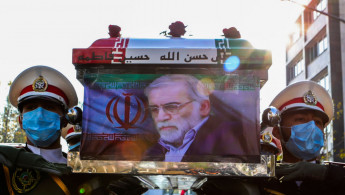Mossad assassinated Iran's top nuclear scientist with remote-operated machine gun: report
A top Iranian nuclear scientist who was assassinated in Iran last November was killed by a remotely controlled robot machine gun, a report by the New York Times revealed on Saturday.
Mohsen Fakhrizadeh, the "father" of Iran's nuclear weapons program, was shot with a computerised machine gun controlled by Israel's Mossad operatives, the NYT report said.
The weapon used in the high-profile assassination of was a modified Belgian-made FN MAG machine gun attached to a robotic apparatus and powered with artificial intelligence technology, the in-depth report revealed.
The whole device weighed about a ton and was smuggled into Iran in small parts ahead of the operation and then reassembled, the report added.
The Mossad-led the operation from a command centre outside Israel, according to the report in which the NYT said was based on interviews with US, Israeli and Iranian officials, "including two intelligence officials familiar with the details of the planning and execution of the operation".
Israel had been closely following Fakhrizadeh's career and movements since at least 2007 and began making preparations for an assassination operation in late 2019 and early 2020, the report said.
A series of meetings were held between Israeli officials led by then-Mossad director Yossi Cohen and high-ranking US officials, including then-US President Donald Trump, US Secretary of State Mike Pompeo and the CIA director Gina Haspel, the NYT said.
"If Israel was going to kill a top Iranian official, an act that had the potential to start a war, it needed the assent and protection of the United States," the NYT reported.
"In Mr. Netanyahu’s best-case scenario, the assassination would derail any chance of resurrecting the nuclear agreement even if Mr. Biden won," the report read.
Fakhrizadeh, 59, a physicist, an officer in the Islamic Revolutionary Guard Corps and a professor at the Imam Hussein University in Tehran, was killed on November 27, 2020, while en route with his wife from their vacation home on the Caspian Sea to their country house in Absard, east of Tehran.
He was driving his own vehicle, a black Nissan Teana sedan, with his wife sitting in the passenger seat beside him and his bodyguards in separate cars behind him.
The computerised machine gun was affixed to an abandoned-looking car, a blue Nissan Zamyad pickup truck, stationed by Iranian agents working with the Israeli agency at a junction on the main road, where drivers heading for Absard had to make a U-turn, according to the report. The truck was laden with a camera and explosives so it could be destroyed after the hit.
When Fakhrizadeh was heading out, "the assassin, a skilled sniper, took up his position, calibrated the gun sights, cocked the weapon and lightly touched the trigger" - all from an "undisclosed location thousands of miles away" and no longer in Iran.
When Fakhrizadeh's vehicle arrived at the junction, another vehicle with his bodyguards made way to the vacation home to inspect it before his arrival, leaving him exposed.
The remaining vehicles in the convoy slowed for a speed bump just before the parked truck, at which point the operatives identified Fakhrizadeh as the driver of the Nissan and unleashed a hail of bullets, hitting the car below the windshield.
The report said that it was unknown whether Fakhrizadeh was injured but the car swerved and came to a stop, after which he stepped out and crouched down before the open door.
He was then hit with three more bullets that "tore into his spine" and collapsed on the road.
The blue truck then exploded but most of the equipment remained largely intact though severely damaged.
A total of 15 bullets were fired and the whole assassination was over in less than 60 seconds, the New York Times reported.
At the time, Iran's Revolutionary Guards said that a satellite-controlled gun with "artificial intelligence" was used in the attack, which Tehran immediately blamed on Israel. Iran vowed to take revenge once its investigations were concluded.




 Follow the Middle East's top stories in English at The New Arab on Google News
Follow the Middle East's top stories in English at The New Arab on Google News


![A group of Palestinians, foreign and Israeli activists gather to participated in an olive picking event on the land in the town of Battir, which is under threat of confiscation by Israel in Bethlehem, occupied West Bank on 8 November 2024. [Getty]](/sites/default/files/styles/image_330x185/public/2182930803.jpeg?h=199d8c1f&itok=__0LgGsa)